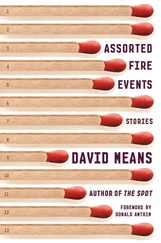“So what do you think happens at the external level?” he asked. His eyes were unusually steady, glinting. He drummed his fingers on his desk and waited while Singleton took a guess and suggested more self-deception and he grunted and said, No, not self-deception, but honest, up-front deception, and Singleton muttered another “Yes, sir,” and watched Klein make his fish-mouth suck again around the pipe stem, even though it was on his desk, far away from his lips, and then Klein went on to explain that Rake wasn’t dead until he saw his body, bore witness to it himself, because it was easy to disfigure a body, or cut up a face, and then dangle dog tags around a neck to make it look like it was Rake. When he asked if Singleton was with him, Singleton muttered another “Yes, sir,” and Klein explained that he wanted to segue — Jesus, I hate that word, he said — into something that had to do with Singleton, and Singleton, again, said “Yes, sir,” and listened to Klein as he explained that self-deception, no, make that up-front deception, includes — and this is the segue, he said — the fact that someone who has been through the treatment, who has had the CEP enfolded, is going to feel a desire to unfold. He might think he doesn’t have that desire, and his internal governing systems might trick him into feeling assured that he is no longer feeling the desire, that he’s over the hump, but in truth it’s only natural to want to know the story. “You feel good and clean with the trauma put away, but at the same time you want to know what really happened. I’m sure you were told in post-treatment about the itchy sensation you’d feel, the fuzzball, a neurological dust bunny. But I don’t know if you were instructed, if they told you in clear terms that you’ll want to know what’s up there in your head and at the same time — and this is the paradox, son — you also don’t ever, ever want to know because to know would mean you’re back in the horrific state you were in before you got the treatment.”
“Yes, sir,” Singleton said. Sweat had soaked through his shirt and he could feel it trickling along his back.
“Now let me say something they probably didn’t tell you in post-treatment, or at least didn’t emphasize. They don’t tell you how destructive the desire to know can be. How you might turn to drugs. How you might have a desire for orgasmic states. How you might find yourself wanting to wade into cold water, and so on and so forth,” he said. He paused and dabbed at the sweat on his face again. Then he went on to explain that trainees were looking for indirect knowledge, a newspaper photo with themselves in it, or a television news report in which they appear, or better yet contact with someone who was a part of their initial trauma, the CEP, in a way that provides a little bit of information but not too much. Then they feel relieved. To find what they knew but didn’t know they knew, he said. Singleton nodded and said, “Yes, sir.”
“On the other hand,” he said. “You might be tempted to test the water, to take a dip in an ice bath, or, in the parlance of a foot soldier, get laid in the best way, usually with drugs, and then unfold. Your internal governor pushes the idea that you can catch a flash here, a flash there, and be done with it. Are you with me?”
Maintain eye contact, Singleton said to himself. He was thinking about Wendy, her strange mix of kindness and care and wildness.
Klein was saying he believed that he, Singleton, would take his advice to heart. He didn’t want him to end up like his last trainee, bluer than his balls in Korea, on the rocks, like an olive in a cocktail, dead in a bathtub full of ice, just because he wanted to know what he had been through. Klein lifted a pipe and lit it and then stared across the desk. He furrowed his brow and puffed and asked if they were good, if the message had been received, and Singleton nodded and said, “Yes, sir. We’re good.”
The question came out to fill the silence. He asked it without thinking, in a sudden jerking sensation. His voice came ahead of him into the silence. Klein had said he was free to go, to head out and have an Internal afternoon. The question had been floating from day to day, in all of the secretive afternoon motions, together on the beach, in bed, in her apartment. He wanted some sort of explanation to straighten out the sense that everything — from the walls of the apartment, to the strange fate that seemed to arrange a meeting with an old buddy — was shrouded in hidden meaning. So he asked it straight out, saying, “Why don’t you just send us up there to track him down, to see what’s going on?”
Klein waited a few beats before answering, the sweat growing on his brow, his eyes shifting slightly, interrogative, swinging around from Singleton’s mouth and up to his brow and then to his neckline, looking for some betraying twitch. Then he asked who “us” was, and Singleton, catching himself, explained that he meant us as in me, as in the two selves, the enfolded part and the part of himself here, now, as someone functioning inside the structure of the Corps, of his work, the part that had been trained so far. Klein stood up and looked, for a second, unusually frail. He had thin legs and his trousers were cut wide, bagging around them, and he shook slightly. He put one hand on his desk, leaning back to assume a casual stance, and ordered Singleton to stand. Then he reached out — it was a gesture that was fatherly — and put his hands on Singleton’s shoulders. The buzz in his ears increased. He was experiencing, he’d later think, a boot camp sensation, a feeling he might’ve had (he could only speculate) when some drill sergeant ordered him to get down and give me fifty. Klein’s voice shifted, grew tender — his gullet throbbed like a turkey.
“If I had my way I’d send you on a mission immediately, but I don’t have my way, son, because I’m following orders, and even a man in my position has to follow orders. Even Haig was following orders as supreme commander. I’ll resist the urge to pontificate again about MacArthur.”
“Yes, sir,” Singleton said.
“I’m giving you an order, and that order is to get out of my sight and stay out of my sight for the afternoon. If you stop thinking about yourself in the collective ‘we,’ it might help you locate intuitive material for the mission.”
Walking back behind his desk he stumbled again and fell into his chair.
The dank smell of the lake drifted through the window. Rake was downstairs. The radio in the kitchen poured out lyrics steeped in blood and vengeance. The house’s frame was cracking in the first real heat of the year, under the weight of the slate roof. The smell of attic dust seeped down from the cracks in the ceiling. Steadily, day by day, Hank had drawn himself into the role of Old Hank until she began to wonder if he had slipped into his old ways completely. Lying in bed one morning she imagined that Rake would take her away one of these mornings, before dawn, when the rest of the house was asleep, shaking her awake and telling her not to say a word. The gun he waved around when the evening card games didn’t go his way would be against her forehead, a cold kiss to her brow as she rose up from her dream. She’d be only half-surprised, because she had woken before to that feeling, down in Alpena, in other places. It was a game he played, to see her startled eyes going from side to side. Rake said he liked her when she slept, but he’d warned her never to sleep too deeply. I want you to feel what I felt and what I feel now. I want you to learn to sleep with your eyes wide open. I want my exhaustion to become yours . He’d wave the gun and she’d think, Go ahead, shoot me, get it over with, it would be the best thing you could do, but she’d keep moving because she would think about Hank and feel that feeling she knew was love; a small warm place near her breastbone (because it had to be compartmentalized), and then she’d think: Just move and do as he says, and then he’d make her go ahead of him, down the stairs, after whispering: Don’t make a noise, and avoid that second-to-the-last step, that one’s a squawker, because if you wake them I’ll have to kill them all, Hank first; and you don’t want to let Hank die, I know that because I saw you two out there behind the barn and I saw him kiss you; you think I wasn’t home but I was home, I’m always home; my eyes are always here. I might be out and about, but my eyes stay on this house.
Читать дальше












